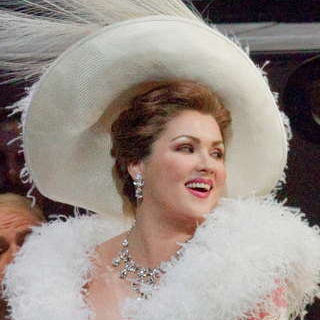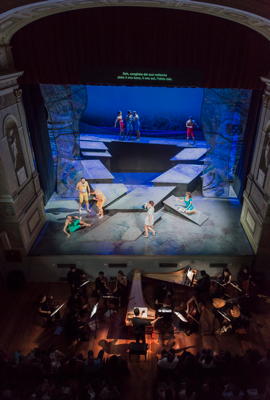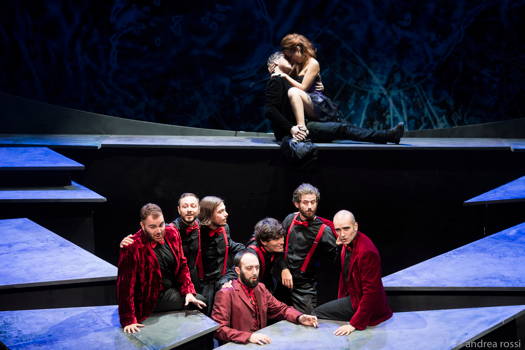 SPONSORED: Vocal Glory - Massenet's Manon in HD from New York Metropolitan Opera, enjoyed by Maria Nockin.
SPONSORED: Vocal Glory - Massenet's Manon in HD from New York Metropolitan Opera, enjoyed by Maria Nockin.
All sponsored features >>
Don Giovanni's Forefather
GIUSEPPE PENNISI writes about a performance of
'L'empio punito' by Alessandro Melani
Just a few blocks from Teatro dell'Opera di Roma, where a disappointing Mozart Don Giovanni is on, the first opera written on the subject of Don Juan can be seen and heard in the small cozy Teatro di Villa Taverna - planned for an audience of 130 including two tiers of balconies.
This is L'empio punito (The rake's punishment) by Alessandro Melani (1639-1703), to a libretto by Giovanni Filippo Apolloni and Filippo Acciaiuoli. It is Don Giovanni's forefather. The opera was commissioned by Marie Mancini - a niece of Giulio Cardinal Mazzarino, Louis XIV's right hand - for performance during Carnival of 1669. The work premiered at the Teatro di Palazzo Colonna in the historic Borgo district of Rome on 17 February 1669, 350 years ago. Most likely, the Italian noble woman knew Don Juan through Molière's 1665 play because she had lived in Paris for several years. L'empio punito was a major event because the staging was so expensive that the Colonna family had to resort to what is now called crowd funding to finance it; even Queen Christine of Sweden, then in self-imposed exile in Rome, had to chip in to finance the staging.
The opera ought to have been a success because music historians report performances in Florence and Bologna, in aristocratic palaces not in commercial theatres. In recent times, it appeared in May 2003 at Leipzig Opera in a fully staged lavish production with Christophe Rousset and Les Talens Lyriques; it was revived the same year in concert form at the Beaune Baroque Music Festival. In a concert version too, the opera was presented at the 2004 Radio France Festival in Montpellier. A selection of numbers were performed in a semi-staged production in Pisa in 2015.
The present production is by the Reate Festival: after a few performances in Rome, it will be staged in Rieti in the Teatro Vespasiano. It is the first revival in Italy since 1669. However, the Italians celebrate Melani for the 350th anniversary of this opera. A different production will be seen and heard in mid-October at the Teatro Verdi di Pisa and in Melani's birth place, Pistoia.
Most likely, this will be the start of a new life for L'empio punito for two reasons: it is an absolute masterpiece, at the level of Monteverdi's operas; and it is an excellent example of the Roman Baroque school. Whilst the Baroque schools of Venice and Naples are well known and studied, only a few scholars - Lorenzo Tozzi, Alessandro Quarta and Andrea De Carlo - devote time and effort to delve into Roman Baroque music and operas. The style is terse, not flowery; the choral parts recall madrigals. Yet, without a knowledge of Roman Baroque it is hard to understand Handel, who lived and worked in Rome during his formative years, especially his now famous oratorio Il trionfo del tempo sul disinganno.
The opera alternates drama and comedy, including references to the Commedia dell'arte. It provides a rather amoral picture of society with a lot of intrigues and sex, even though at the very end, the main culprit is punished and sent to hell. Most likely, albeit in 1669 the opera was promoted by the Pope himself, the society depicted was quite similar to that of the aristocracy enjoying it at the Colonna Palace.
The production seen and heard on 29 September 2019 is elegant and effective, even though on a shoestring budget. In 1669, albeit following quite closely Tirso da Molina's 1616 play El Burlador de Sevilla y Convidado de pietra, the libretto sets the action in ancient Greece and provides for extravagant sets: sea tempests, palaces, gardens, jail, and hell. This is a reason, no doubt, for the high cost of the 1669 production. At the Reate Festival, Teatro di Villa Torlonia production, the action develops in the twentieth century. A single set by Michele Della Cioppa and Anna Biagiotti's elegant costumes - both on loan by the Teatro dell'Opera - provide well for the several set changes provided for in the libretto. The orchestral ensemble plays on period instruments and is conducted by Alessandro Quarta. The three acts of the original libretto are compacted into two acts of seventy-five and sixty minutes. The action flows swiftly due to the experienced stage direction by Cesare Scarton. There are a few cuts, as compared with the score, but they are minor and improve the development of the drama.

The initial scene from L'empio punito by Alessandro Melani. Photo © 2019 Andrea Rossi
The Accademia Filarmonica Romana also helped this great production by providing its rehearsal facilities.
The cast is young and enthusiastic; the singers/actors have been selected after competitive auditions with the support of the Alberto Sordi Foundation for Young Artists. They are well-versed in recitar cantando, the style required in seventeenth century opera. Some of them - Mauro Borgioni, Michela Guarrera, Giacomo Nanni and Luca Cervoni - had impressed me already about one year ago in Monteverdi's Il ritorno d'Ulisse in patria produced by the same group - see Ulysses' Homecoming in Music & Vision Magazine, 8 October 2018. There are eleven singers/actors in some twenty different roles. Most of them specialize in baroque music and are already in careers, either in Italy or abroad.

Proserpina's kiss in L'empio punito by Alessandro Melani. Mauro Borgioni as Acrimante and Maria Elena Pepi as Proserpina, with (below) the chorus of devils. Photo © 2019 Andrea Rossi
The audience erupted in well deserved ovations at the curtain calls.
I regret that after a few performances in Rome and Rieti, the production will close shop. There will be, though, a DVD on the Dynamic label, which will hopefully also be seen on Italian and foreign operatic TV channels.
Copyright © 5 October 2019
Giuseppe Pennisi,
Rome, Italy




